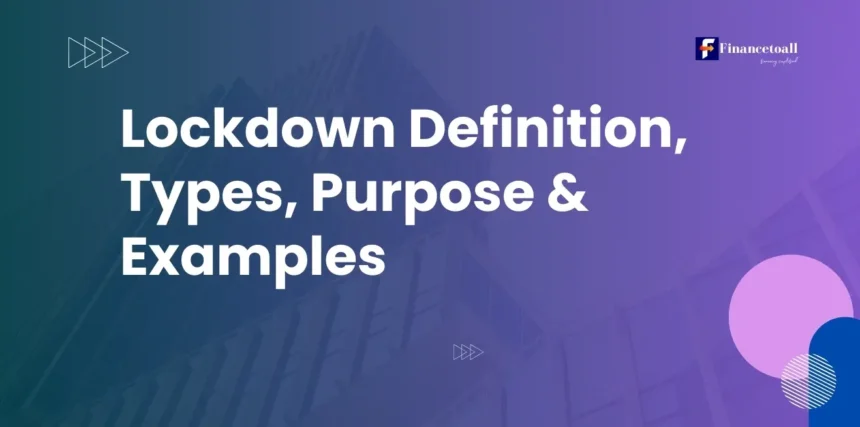Understanding Financial Lockdown: A Comprehensive Guide
A lockdown refers to restrictions on access to funds or transactions, often used during times of market instability or crises. These measures protect investors, stabilize markets, and ensure compliance with regulatory requirements.
A financial lockdown is when access to assets, liquidity, or transactions is restricted temporarily. These restrictions are often put in place during times of market instability, regulatory actions, or specific contractual obligations. In this Article we will talk about what is financial lockdowns, their purpose, their implications, and how you can navigate through them with confidence.
Key Takeaways About Financial Lockdowns
- Purpose: Stabilize markets and protect investors during volatility.
- Impact: Limit access to funds; prepare with diversification and cash reserves.
- Types: IPO lockups, hedge fund restrictions, capital controls, and circuit breakers.
- Tech Role: Blockchain and AI improve fairness and efficiency.
- Investor Tip: Understand terms to minimize risks and stay resilient.
What is a Financial Lockdown?
A financial lockdown happens when your access to funds, investments, or trading activities is restricted due to specific conditions. Think of it as a safety measure that aims to stabilize markets or prevent financial chaos. These restrictions can affect individuals, businesses, or even entire markets.
Key Examples of Financial Lockdowns
- Lockup Period in IPOs When companies go public, early investors like employees or venture capitalists are restricted from selling their shares for a certain period, typically 90-180 days. This ensures the market isn’t flooded with shares too soon, which could drive prices down. Example: In Uber’s IPO, employees had to wait six months before selling their shares.
- Capital Controls During Crises Governments might limit the amount of money people can withdraw or transfer to foreign accounts to protect the country’s economy. Example: During Greece’s debt crisis in 2015, citizens faced restrictions on ATM withdrawals and international transactions.
- Hedge Fund Lockups Investors in hedge funds often agree to keep their money invested for a specific timeframe to allow fund managers to invest in long-term assets. Example: A hedge fund might require a two-year lockup to make illiquid investments in real estate or private companies.
Why Do Financial Lockdowns Happen?
Financial lockdowns are not arbitrary but they serve specific purposes this means:
- Stabilizing the Market Financial markets can be volatile, and lockdowns prevent panic-driven moves like mass sell-offs that could lead to a market crash.
- Protecting Investors By locking in investments temporarily, regulators and companies aim to protect long-term investors from short-term volatility.
- Preventing Systemic Risk Lockdowns can stop a domino effect in financial systems. For instance, if one bank collapses, restrictions might be placed on withdrawals to prevent a full-scale banking crisis.
- Regulatory Compliance Lockdowns ensure that financial transactions comply with laws and regulations, especially during mergers, acquisitions, or market disruptions.
What Is a Lockup Period?
A lockup period is a restriction that prevents investors from selling their shares for a set period, often after an IPO. This prevents market instability by avoiding sudden sell-offs immediately after the public offering.
Types of Financial Lockdowns
Different types of financial lockdowns and how they affect investors, companies, and markets.
1. Lockup Periods in Investments
- What It Means: Lockup periods are contractual agreements that restrict investors from selling their shares for a specified time.
- Why It’s Used: To avoid excess volatility in the stock price after a major event like an IPO.
- Example: If you were an early investor in Airbnb during its IPO, you couldn’t sell your shares for 180 days, even if the stock price skyrocketed.
2. Capital Controls by Governments
- What It Means: Capital controls limit the amount of money individuals or businesses can move out of a country.
- Why It’s Used: To stabilize the currency or prevent financial resources from leaving the country.
- Example: Argentina implemented capital controls in 2019, restricting dollar purchases to $10,000 per person per month.
3. Hedge Fund and Private Equity Lockups
- What It Means: Investors in these funds agree to lock up their capital for years, allowing fund managers to invest in illiquid assets.
- Why It’s Used: To give fund managers the freedom to execute long-term strategies without the pressure of sudden withdrawals.
- Example: A private equity firm might require a five-year lockup to invest in startups or infrastructure projects.
4. Market Suspension and Circuit Breakers
- What It Means: Stock exchanges may halt trading during extreme volatility to prevent further losses.
- Why It’s Used: To cool down the market and restore order.
- Example: In March 2020, U.S. stock markets triggered circuit breakers multiple times during the COVID-19 pandemic.
5. Escrow Accounts and Asset Freezes
- What It Means: Funds or assets are temporarily held in an escrow account until specific conditions are met.
- Why It’s Used: To ensure that all parties in a transaction meet their obligations.
- Example: When selling real estate, the buyer’s funds might be locked in escrow until the property title is transferred.
Why Are Financial Lockdowns Important?
Financial lockdowns are implemented to prevent market crashes, protect long-term investments, and ensure financial system stability. They help avoid panic selling and manage systemic risks during volatile times.
Impacts of Financial Lockdowns
Lockdowns can have both positive and negative consequences.
Positive Impacts
- Prevents Panic Selling: Lockdowns protect markets from sudden crashes during times of uncertainty.
- Encourages Long-Term Thinking: Investors are less likely to make impulsive decisions when they know their funds are locked.
- Stabilizes Financial Systems: Restrictions help prevent systemic risks that could spiral out of control.
Negative Impacts
- Limits Liquidity: Investors may face challenges accessing their money when they need it most.Example: During the 2008 financial crisis, some money market funds froze withdrawals.
- Investor Frustration: Lack of access can lead to mistrust, especially if restrictions aren’t clearly communicated.
- Economic Slowdown: Prolonged restrictions can hurt businesses and consumer spending.
How to Navigate Financial Lockdowns
If you’re an investor or a business, understanding how to deal with financial lockdowns can make a big difference. Here are some practical tips:
- Diversify Your Portfolio: Spread your investments across different asset classes to avoid being overexposed to any one restriction. Example: If one market freezes withdrawals, you’ll still have access to funds in another.
- Understand the Terms: Always read the fine print in investment agreements. Know the lockup periods, penalties, and exit clauses.
- Keep a Cash Reserve: Having an emergency fund ensures you can manage liquidity issues during a financial lockdown.
- Stay Informed: Follow market trends and regulatory updates to anticipate potential restrictions.
Capital Controls and Their Effect on Citizens
Capital controls are measures imposed by governments to limit the movement of money, especially during economic crises. These controls can restrict how much money individuals can withdraw or transfer internationally, protecting national financial stability.
The Role of Technology in Financial Lockdowns
As technology evolves, financial systems are becoming more sophisticated, making lockdowns more efficient and transparent.
Blockchain and Smart Contracts
- Blockchain technology can lock funds in smart contracts, automatically releasing them when conditions are met.
- Example: Real estate deals can use smart contracts to lock funds until the property title is transferred.
AI for Risk Management
- Artificial intelligence can predict market conditions that might require a lockdown, helping regulators act proactively.
How Do Hedge Fund Lockups Affect Investors?
Hedge fund lockups require investors to keep their capital invested for a fixed period, typically 1-5 years. This helps fund managers focus on long-term strategies but limits the liquidity available to investors during the lockup period.
Are Financial Lockdowns Good or Bad?
Financial lockdowns can stabilize markets and protect investors, but they also limit liquidity and can frustrate those who need immediate access to their funds. The benefits and drawbacks depend on the context of the lockdown.
Conclusion
Financial lockdowns are a necessary part of maintaining stability in the financial system. Whether it’s a lockup period after an IPO, government-imposed capital controls, or restrictions in hedge funds, these measures aim to protect markets, investors, and economies. However, they can also pose challenges, especially when they limit access to funds.
By understanding the types, purposes, and impacts of financial lockdowns, you can make informed decisions and navigate them effectively. Always diversify your investments, understand the terms of any agreement, and maintain a cash reserve for emergencies.
Frequently Asked Questions (FAQs) About Financial Lockdowns
1. What is a financial lockdown?
A financial lockdown refers to restrictions on access to financial assets, funds, or transactions. These can be imposed by governments, financial institutions, or contractual agreements to stabilize markets, protect investors, or manage risks during volatile situations.
2. Why do financial lockdowns occur?
Financial lockdowns are implemented to:
Stabilize financial markets during periods of uncertainty.
Prevent systemic risks and mass sell-offs.
Ensure regulatory compliance.
Protect long-term investors from short-term volatility.
3. What is a lockup period in finance?
A lockup period is a specified timeframe during which investors, such as insiders or early stakeholders, are restricted from selling their shares. This is common after an IPO to avoid excessive volatility in stock prices.
4. How do capital controls work in a financial lockdown?
Capital controls limit the flow of money out of a country or restrict the amount of money individuals can withdraw or transfer. These are typically imposed by governments during economic crises to stabilize their currency and manage foreign reserves.
5. What are circuit breakers in stock markets?
Circuit breakers are mechanisms used by stock exchanges to halt trading temporarily during extreme market volatility. This is a form of financial lockdown designed to prevent panic-selling and give the market time to stabilize.
6. How do hedge fund lockups affect investors?
Hedge fund lockups require investors to keep their capital invested for a predetermined period, often years. While this allows fund managers to execute long-term strategies, it limits liquidity for the investors.
7. Are financial lockdowns beneficial or harmful?
Financial lockdowns can have both positive and negative effects:
Benefits: They stabilize markets, prevent systemic risks, and protect investors.
Drawbacks: They limit liquidity and may frustrate investors or businesses in need of immediate funds.
8. How can I prepare for a financial lockdown?
To prepare for a financial lockdown:
Diversify your investments to reduce risk.
Keep an emergency cash reserve for liquidity needs.
Stay informed about potential restrictions and regulatory updates.
Understand the terms of any investment agreements or lockup periods.
9. Can I withdraw my money during a financial lockdown?
It depends on the type of lockdown. For example:
In capital controls, withdrawal limits may apply.
In hedge funds or IPO lockup periods, you must wait until the lockup expires.
Emergency funds or cash reserves remain accessible unless otherwise restricted.
10. Are there penalties for violating a financial lockdown?
Yes, violating a financial lockdown, such as breaking a lockup period agreement, may result in penalties, including fines, legal consequences, or loss of profits from unauthorized transactions.









